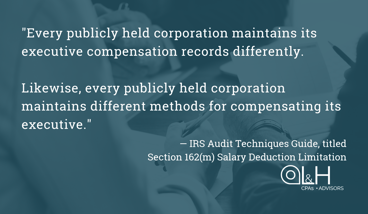Tax-Efficient Diversification for Executives with Low-Basis Stock
Meet Alex, a high-level executive who's accumulated a significant amount of low-basis stock in his company. Alex is keen to diversify this...
3 min read
L&H CPAs : Aug 3, 2019 11:37:23 AM

When IRS auditors begin the task of examining a company, they must first learn the in-house terminology utilized by the firm, as well as how records are maintained. In the case of executive compensation, the IRS is especially interested in arrangements in which the company deducts the high salary of one of its top executives using an exception under Internal Revenue Code Section 162(m).
Under this code section, which applies to publicly traded corporations, no deduction is generally allowed for annual compensation that exceeds $1 million for "covered employees." However, there is an exception for "qualified performance-based" compensation, which must meet several requirements.

In its guide for auditors, the IRS instructs examining agents to "first learn the identity of the
individual(s) within the corporation who are most familiar with how the executive compensation records are maintain
ed." Then, the auditor is told to have a general discussion with that person regarding executive compensation so that the IRS can narrow the focus of the documents it will formally request from the corporation.
Here is a non-comprehensive list of questions that IRS auditors are directed to ask taxpayers in an audit in regards to executive compensation arrangements under IRC Section 162(m):
How are compensation records for each executive maintained? For example, is there a centralized file for each executive, and does it reflect all forms of remuneration for the year?
If centralized files for each executive are maintained, what records should be in the file? For example, if an executive participates in four different compensation arrangements, does the centralized file contain the written agreement and election forms with regard to the executive's participation in each of the plans or programs?
What records are available to reflect stock-based remuneration and how are they maintained? For example, if someone is granted stock options or restricted stock, are the grants evidenced by an Award Agreement or Grant Agreement? How does the corporation track exercises of stock options or the vesting of restricted stock grants? Is a centralized computerized data base used or does the corporation rely on paper documents?
At what level are grants of stock options and restricted stock made? For example, if an executive of a subsidiary is granted stock options, is the grant made at the subsidiary level, or at the parent level?
How is remuneration granted or awarded to an executive? For example, who or what determines the remuneration awarded to an executive: the compensation committee, the Board of Directors, an executive contract?
Will all forms of remuneration be reflected in an executive's employment contract? Or are there other methods by which remuneration can be awarded, such as an annual incentive plan, yearly bonus pool, long-term incentive plan, stock option plan, restricted stock plan, phantom or restricted stock unit plan, etc.?
How are the compensation committee minutes maintained? Do they include proposals, exhibits, attachments, resolutions, etc.?
Does the corporation provide phantom grants or awards, such as phantom stock or phantom equity? If so, how are they documented and tracked?
Does the corporation provide deferred compensation arrangements? If so, how are they documented? For example, are they via written agreements or election forms? How are deferred amounts tracked by the corporation and the executive (for example, by separate accounts, monthly statements, etc.)?
Does the corporation utilize the services of outside administrators, brokers, or consulting companies in the formation, administration and management of its various executive compensation plans or programs? If so, who are they and what plans or programs are they connected with?
How are stock options and restricted stock grants exercised and how are exercises made effective? For example, are stock options exercised directly with the corporation or through a broker or other third-party? And when an executive exercises stock options, does the executive receive the certificates evidencing the shares of stock upon exercise? Does he or she have to pay the exercise price for the options exercised or is there an option of a cashless exercise? Can the executive receive the difference between the exercise price and the fair market value of the stock in cash or other property?
Does the corporation have grant detail reports reflecting options granted, the grant number of the option, the dates of exercise of the options, and the fair market value of the stock as of the date of exercise? If so, how are these records maintained and are they available for individual executives?
Does the corporation provide split-dollar life insurance policies to any of its executives?
Does the corporation use acronyms, codes or other symbols to identify transactions, such as stock options that were granted as the result of a bonus plan? If so, what are they and what do they mean?
Does the firm defer compensation that would otherwise exceed the $1 million limit from years when the recipient is a covered employee for purposes of Section 162(m) to years when the recipient is not covered? If so, the IRS auditor will want to determine whether the deferred amounts were actually or constructively received by the recipient during an earlier year (when the recipient was a covered employee), resulting in a disallowance of the deduction (for the year of payment and the year the amounts were received).
Also, if amounts are paid within 2 and 1/2 months after the end of a year in which the recipient was a covered employee and accrued during that year, the deduction should be claimed for the year of accrual (and therefore should be subject to the Section 162(m) limitation), not the year of payment (when the limitation would not apply).
Does the corporation have one or more qualified performance-based compensation plans that have been approved by its stockholders? If so, the IRS will want to determine whether those plans are in compliance with Section 162(m) in form and operation.
Has the corporation made modifications to performance goals or targets after the beginning of the period to which such goals or targets relate? Were amounts paid to covered employees whether or not the relevant goals and targets were attained?
Which executives were listed on the corporation's summary compensation table in the corporation's annual proxy statement for the years at issue?

Meet Alex, a high-level executive who's accumulated a significant amount of low-basis stock in his company. Alex is keen to diversify this...

Like business executives, you may have expertise in marketing, production and sales. Yet the short and long-term profitability of your company relies...

There’s no law that says you can’t prepare your own estate plan. And with an abundance of online services that automate the creation of wills and...